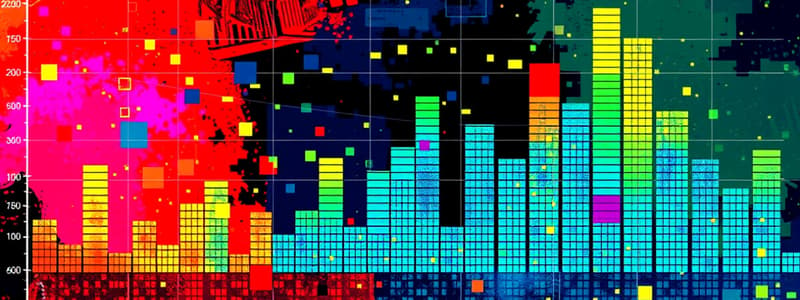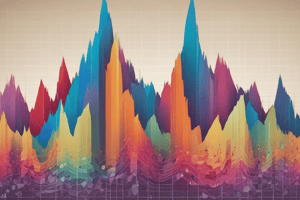Podcast
Questions and Answers
Which histogram has the most amount of variation?
Which histogram has the most amount of variation?
- Less spread out
- More spread out (correct)
How would you describe the shape of the histogram? (Select all that apply)
How would you describe the shape of the histogram? (Select all that apply)
- Symmetric
- Skewed left (correct)
- Bimodal
- Uniform
- Skewed right (correct)
The spread of data for the outdoor group and the indoor group are equal.
The spread of data for the outdoor group and the indoor group are equal.
False (B)
The spread of data for the outdoor group is 2 mood levels greater than the indoor group.
The spread of data for the outdoor group is 2 mood levels greater than the indoor group.
The spread of data for the indoor group is 2 mood levels greater than the outdoor group.
The spread of data for the indoor group is 2 mood levels greater than the outdoor group.
The spread of data for the outdoor group is 5 mood levels greater than the indoor group.
The spread of data for the outdoor group is 5 mood levels greater than the indoor group.
What is the mean of the data set 10, 5, 3, 12, 15, 13, 8, 9, 2, 3?
What is the mean of the data set 10, 5, 3, 12, 15, 13, 8, 9, 2, 3?
What is the median of the data set 10, 5, 3, 12, 15, 13, 8, 9, 2, 3?
What is the median of the data set 10, 5, 3, 12, 15, 13, 8, 9, 2, 3?
What is the mode of the data set 10, 5, 3, 12, 15, 13, 8, 9, 2, 3?
What is the mode of the data set 10, 5, 3, 12, 15, 13, 8, 9, 2, 3?
What is the range of the data set 10, 5, 3, 12, 15, 13, 8, 9, 2, 3?
What is the range of the data set 10, 5, 3, 12, 15, 13, 8, 9, 2, 3?
What is the standard deviation of the data set 10, 5, 3, 12, 15, 13, 8, 9, 2, 3?
What is the standard deviation of the data set 10, 5, 3, 12, 15, 13, 8, 9, 2, 3?
What is the mean of the data set 8, 1, 3, 10, 4, 5?
What is the mean of the data set 8, 1, 3, 10, 4, 5?
What is the median of the data set 8, 1, 3, 10, 4, 5?
What is the median of the data set 8, 1, 3, 10, 4, 5?
What is the mode of the data set 8, 1, 3, 10, 4, 5?
What is the mode of the data set 8, 1, 3, 10, 4, 5?
What is the range of the data set 8, 1, 3, 10, 4, 5?
What is the range of the data set 8, 1, 3, 10, 4, 5?
What is the standard deviation of the data set 8, 1, 3, 10, 4, 5?
What is the standard deviation of the data set 8, 1, 3, 10, 4, 5?
What is the mean of the data set 3, 3, 4, 5, 5, 5, 5, 7, 7, 7, 8, 10, 13?
What is the mean of the data set 3, 3, 4, 5, 5, 5, 5, 7, 7, 7, 8, 10, 13?
What is the median of the data set 3, 3, 4, 5, 5, 5, 5, 7, 7, 7, 8, 10, 13?
What is the median of the data set 3, 3, 4, 5, 5, 5, 5, 7, 7, 7, 8, 10, 13?
What is the range of the data set 3, 3, 4, 5, 5, 5, 5, 7, 7, 7, 8, 10, 13?
What is the range of the data set 3, 3, 4, 5, 5, 5, 5, 7, 7, 7, 8, 10, 13?
What is the mode of the data set 3, 3, 4, 5, 5, 5, 5, 7, 7, 7, 8, 10, 13?
What is the mode of the data set 3, 3, 4, 5, 5, 5, 5, 7, 7, 7, 8, 10, 13?
What is the standard deviation of the data set 3, 3, 4, 5, 5, 5, 5, 7, 7, 7, 8, 10, 13?
What is the standard deviation of the data set 3, 3, 4, 5, 5, 5, 5, 7, 7, 7, 8, 10, 13?
Flashcards are hidden until you start studying
Study Notes
Comparing Data Sets Features
-
Center: Represents the midpoint of a distribution where half of the observations lie on either side. Use Mean (average) and Median (middle value when ordered) for calculation.
-
Spread: Reflects the variability in data. A wider range indicates a larger spread while a tighter grouping suggests a smaller spread. Key measures:
- Standard Deviation: Indicates how dispersed the data is from the mean.
- Range: Difference between the maximum and minimum values (MAX - MIN).
- Interquartile Range: Difference between the first quartile (Q1) and the third quartile (Q3).
-
Shape: Describes the distribution's characteristics, including:
- Symmetry: Balance around the center.
- Skewness: Direction of the distribution's tail (left or right).
- Number of Peaks: Unimodal (one peak), bimodal (two peaks), etc.
- Uniformity: Even distribution across the range.
Analyzing Histograms
-
Assess variation in data by comparing histograms:
- A more spread-out histogram indicates more variation.
- Less spread-out signifies less variation.
-
Describing shapes of histograms:
- Options include Bimodal, Skewed Left, Skewed Right, Symmetric, and Uniform.
Data Comparison Statements
- Determine accuracy of statements comparing two groups using spread:
- True statements reflect the actual spread measure differences.
Key Definitions
- Mean: Calculated by adding all data points and dividing by the total number of points.
- Median: The middle number when values are arranged in ascending order.
- Mode: The most frequently occurring number in a data set.
- Range: Difference between the largest and smallest values.
- Standard Deviation: Indicates how data points deviate from the mean; small values indicate clusters around the mean, while large values indicate widespread data.
Using Desmos for Statistics
- Steps to calculate key statistical measures:
- Access Desmos and enter data points under (x_1).
- Use commands:
stats(x_1)for minimum, Q1, median, Q3, maximum.mean(x_1)for the average.stdevp(x_1)for standard deviation.
Example Data Set Calculations
-
For data set: 10, 5, 3, 12, 15, 13, 8, 9, 2, 3
- Mean: 8
- Median: 8.5
- Range: 13
- Mode: 3
- Standard Deviation: 4.35
-
For data set: 8, 1, 3, 10, 4, 5
- Mean: 5.16
- Median: 4.5
- Range: 9
- Mode: 1, 3, 4, 5, 8, 10
- Standard Deviation: 3.02
-
For data set: 3, 3, 4, 5, 5, 5, 5, 7, 7, 7, 8, 10, 13
- Mean: 6.3
- Median: 5
- Range: 10
- Mode: 5
- Standard Deviation: 2.73
Studying That Suits You
Use AI to generate personalized quizzes and flashcards to suit your learning preferences.




